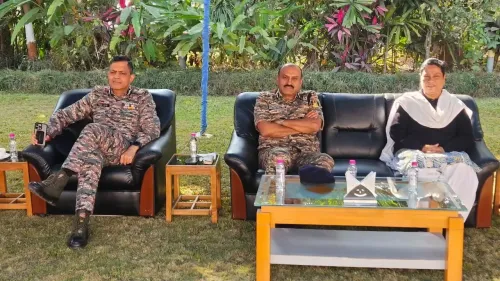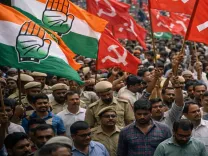Is Bhupesh Baghel Right to Question Centre Over US Mediation?

Synopsis
Key Takeaways
- Bhupesh Baghel demands accountability from the government regarding US mediation.
- Calls for a special session of Parliament to ensure transparency.
- Concerns raised about the potential undermining of the Shimla Agreement.
- Emphasis on the importance of national security and unity.
- Congress remains committed to fighting terrorism and protecting India's sovereignty.
New Delhi, May 12 (NationPress) Senior Congress leader and former Chhattisgarh Chief Minister Bhupesh Baghel has called for a response from the ruling Central government, questioning whether the Shimla Agreement has been compromised and if India has accepted third-party mediation regarding Kashmir.
Baghel emphasized the need for an urgent special session of Parliament and an all-party discussion led by Prime Minister Narendra Modi.
He highlighted the importance of transparency concerning the recent ceasefire announcement made by the US President before any official statement from the Indian government.
Raising significant concerns regarding the ceasefire agreement, Baghel demanded clarity from the government about whether India has accepted outside intervention concerning Kashmir, potentially compromising the longstanding Shimla Agreement.
He questioned if India has bowed to external pressures, insisting on transparency in this crucial issue.
Baghel referenced the strength shown by former Prime Minister Indira Gandhi during the 1971 war, when she resisted US pressure and led India to victory over Pakistan.
He asserted that the Congress party continues to uphold these principles, ensuring that nationalism stands above political interests in the ongoing fight against terrorism.
Highlighting the party’s firm commitment to national security, Baghel noted Congress’s proactive initiatives during crises, including the “Jai Hind Yatras” organized nationwide to honor the bravery of the armed forces and pay respects to terrorism victims.
In contrast, he criticized the BJP’s alleged political tactics, stating that while Congress focuses on national unity, the ruling party prioritizes its own interests.
Baghel also sought clarification on the agreement's terms and any concessions made to Pakistan.
To ensure accountability, Baghel reiterated the necessity for a special session of Parliament and an all-party meeting under Prime Minister Narendra Modi.
He emphasized that the Indian populace deserves to know if the country's foreign policy has altered under international pressure.
Reaffirming Congress's commitment, Baghel concluded by stating the party will remain resolute in combating terrorism and will never allow India's sovereignty to be jeopardized.










